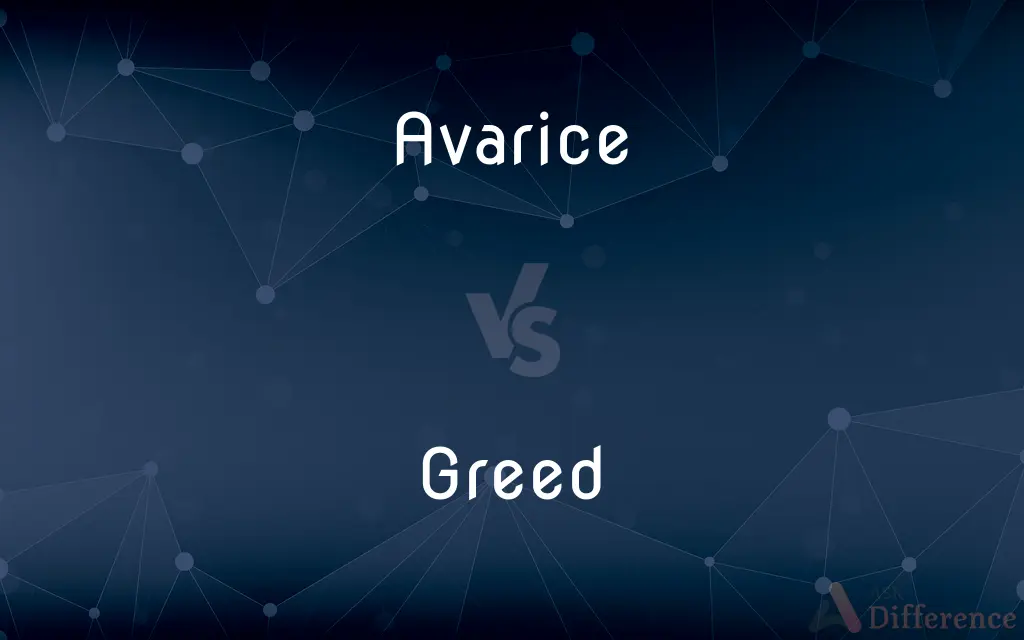Avarice vs. Greed — What's the Difference?
By Tayyaba Rehman & Urooj Arif — Updated on March 4, 2024
Avarice is an extreme greed for wealth or material gain, often seen as miserly hoarding. Greed, broader in scope, refers to an intense and selfish desire for anything, not limited to just wealth.

Difference Between Avarice and Greed
Table of Contents
ADVERTISEMENT
Key Differences
Avarice is a specific form of greed, focusing intensely on the accumulation and hoarding of wealth, often to the point of living in a miserly way despite having abundant resources. Whereas greed can refer to an insatiable and selfish desire for more of anything, such as power, food, or status, without the specific emphasis on hoarding or accumulation.
Avarice is characterized by not only the desire to acquire wealth but also by the reluctance to spend or share it, highlighting a deep fear of loss. On the other hand, greed might not necessarily involve hoarding; it's more about the desire to acquire more, regardless of the need or consequences to oneself or others.
The concept of avarice has been historically associated with moral and religious teachings, often depicted as a vice that leads to unhappiness and ethical downfall. Greed, while also viewed negatively, is seen in a slightly broader context, encompassing a wider range of desires and the consequences of excessive consumption or ambition.
Avarice is often depicted as a corrupting influence that leads individuals to forsake moral principles for the sake of accumulating wealth. Greed, however, is portrayed as a driving force that can lead to both personal downfall and societal harm, suggesting a broader impact.
Despite these differences, both avarice and greed are considered negative traits, reflecting excessive and uncontrolled desires that can lead to personal and social detriment. They underscore the importance of moderation and ethical conduct in the pursuit of personal goals.
ADVERTISEMENT
Comparison Chart
Definition
Extreme greed for wealth, with hoarding and miserliness
Intense desire for more of anything, not limited to wealth
Focus
Accumulation and retention of wealth
Acquisition of wealth, power, status, or other desires
Behavioral Traits
Miserliness, reluctance to spend or share
Not necessarily associated with hoarding; more about acquiring
Historical Context
Often associated with moral teachings as a vice
Viewed negatively in various contexts, including moral teachings
Portrayal in Literature
Corrupting influence, leading to moral forsaking
Driving force behind personal and societal harm
Compare with Definitions
Avarice
Associated with the unwillingness to share resources.
Despite his wealth, his avarice kept him from aiding his own family.
Greed
Intense desire for more, not limited to material wealth.
His greed for power overshadowed his initial intentions.
Avarice
Viewed as a vice in moral teachings.
Historical texts often depict avarice as a path to spiritual and moral bankruptcy.
Greed
Can lead to personal and societal detriment.
Corporate greed was blamed for the economic downturn.
Avarice
Leads to unethical behavior for wealth accumulation.
Avarice drove him to betray his principles for financial gain.
Greed
Drives excessive consumption or ambition.
Greed for fame pushed her into making questionable choices.
Avarice
Extreme greed for wealth, often resulting in hoarding.
His avarice led him to live frugally despite his immense fortune.
Greed
Broadly viewed as a negative trait across cultures.
Tales from various cultures use greed as a moral lesson against excess.
Avarice
Characterized by miserliness and a fear of losing wealth.
Her avarice prevented her from donating to charity, even in times of need.
Greed
Not always associated with hoarding.
Her greed led to excessive spending, not saving.
Avarice
Excessive or inordinate desire of gain; greed for wealth
Greed
Greed (or avarice) is an uncontrolled longing for increase in the acquisition or use of material gain (be it food, money, land, or animate/inanimate possessions); or social value, such as status, or power. Greed has been identified as undesirable throughout known human history because it creates behavior-conflict between personal and social goals.
Avarice
Extreme greed for wealth or material gain
He was rich beyond the dreams of avarice
Greed
Intense and selfish desire for something, especially wealth, power, or food
The colonists' greed for African land
Mercenaries who had allowed greed to overtake their principles
Greed has taken over football
Avarice
Immoderate desire for wealth; cupidity.
Greed
An excessive desire to acquire or possess more than what one needs or deserves, especially with respect to material wealth
"Many ... attach to competition the stigma of selfish greed" (Henry Fawcett).
Avarice
Extreme greed for material wealth
Greed
To desire in a greedy manner, or to act on such a desire.
Greed
An eager desire or longing; greediness; as, a greed of gain.
Greed
Excessive desire to acquire or possess more (especially more material wealth) than one needs or deserves
Common Curiosities
Why is avarice often viewed negatively?
Avarice is viewed negatively because it involves miserliness and an unhealthy focus on accumulating wealth, often at the expense of ethical values and happiness.
Can avarice be considered a type of greed?
Yes, avarice is a specific, intense form of greed particularly related to wealth and material gain.
How do avarice and greed affect personal behavior?
Both can lead to unethical decisions, but avarice specifically manifests in hoarding wealth and being miserly, while greed can drive a broader range of excessive desires.
Can greed have positive aspects?
While traditionally seen as negative, some argue that greed can drive ambition and economic growth, though this view emphasizes the need for balance and ethical considerations.
Is greed always related to money?
No, greed can refer to an excessive desire for various things, including power, food, status, or recognition, not just money.
What role does avarice play in literature?
In literature, avarice is often portrayed as a corrupting influence that leads to personal downfall and moral degradation.
How are avarice and greed depicted in religious or moral teachings?
They are commonly depicted as vices or sins that lead to unhappiness and ethical downfall, warning against the excessive pursuit of material wealth or desires.
What is avarice?
Avarice is an extreme form of greed focused on the accumulation and hoarding of wealth, often accompanied by miserliness.
How does greed differ from avarice?
Greed is an intense desire for more of anything, such as wealth, power, or status, not specifically associated with the hoarding characteristic of avarice.
Does avarice affect interpersonal relationships?
Yes, avarice can negatively affect relationships due to the individual's unwillingness to share wealth or resources, leading to isolation and conflict.
Are there cultural differences in how avarice and greed are viewed?
Cultural perspectives can vary, but avarice and greed are generally viewed negatively across cultures due to their harmful effects on individuals and societies.
Can a society be avaricious or greedy?
Yes, societal or systemic avarice and greed can manifest in policies and practices that prioritize wealth accumulation over wellbeing and ethical considerations.
How can one mitigate the effects of greed or avarice?
Cultivating virtues such as generosity, contentment, and ethical living can mitigate the effects of greed and avarice.
How do avarice and greed impact economic systems?
They can lead to imbalances, such as wealth concentration and exploitation, challenging the sustainability and fairness of economic systems.
What are the societal implications of greed?
Societal implications of greed include economic inequality, exploitation, and environmental degradation, highlighting its potential to cause widespread harm.
Share Your Discovery

Previous Comparison
Slinky vs. Spring
Next Comparison
Withdraw vs. WithdrawalAuthor Spotlight
Written by
Tayyaba RehmanTayyaba Rehman is a distinguished writer, currently serving as a primary contributor to askdifference.com. As a researcher in semantics and etymology, Tayyaba's passion for the complexity of languages and their distinctions has found a perfect home on the platform. Tayyaba delves into the intricacies of language, distinguishing between commonly confused words and phrases, thereby providing clarity for readers worldwide.
Co-written by
Urooj ArifUrooj is a skilled content writer at Ask Difference, known for her exceptional ability to simplify complex topics into engaging and informative content. With a passion for research and a flair for clear, concise writing, she consistently delivers articles that resonate with our diverse audience.
















































